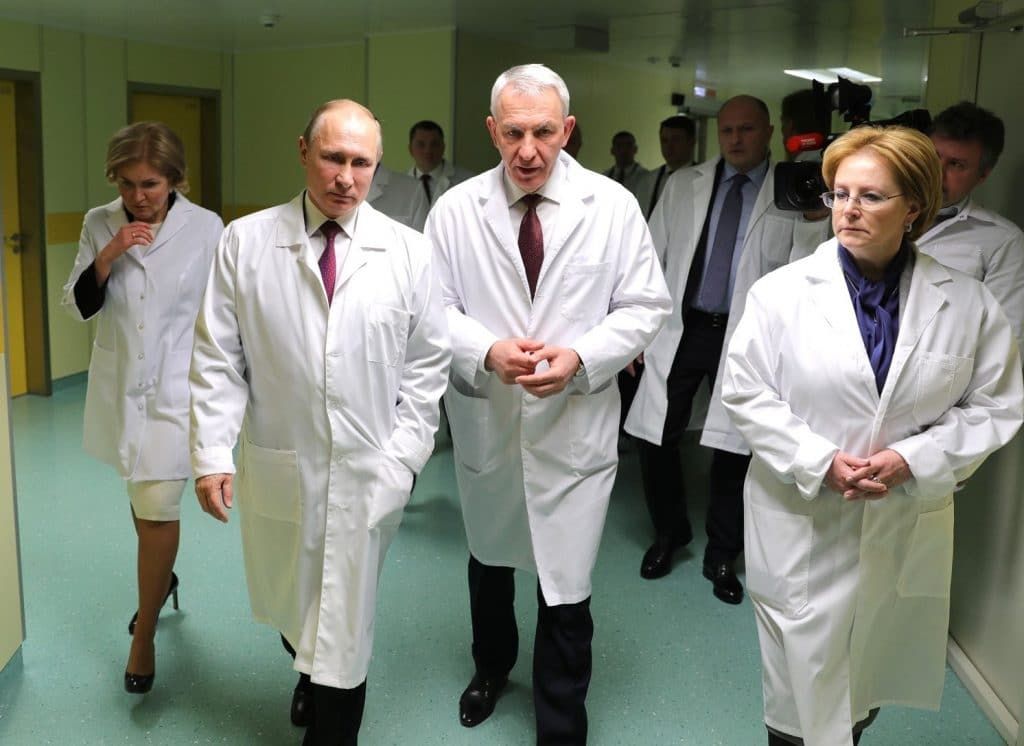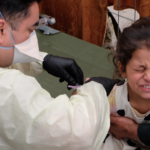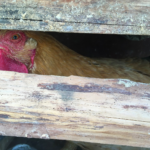Coronavirus in Russia: How Putin’s disinformation efforts could backfire at home
By Judy Twigg | March 31, 2020
 Vladimir Putin visits the Almazov National Medical Research Centre in St. Petersburg, 2017. Photo Credit: Kremlin.ru.
Vladimir Putin visits the Almazov National Medical Research Centre in St. Petersburg, 2017. Photo Credit: Kremlin.ru.
Anyone who hasn’t been living under a rock for the past few years is aware of the Russian government’s well-documented track record of malicious foreign influence campaigns intended to destabilize the political and social ecosystems of other countries. These efforts aim to identify, target, and amplify existing sources of vulnerability. They don’t just willy-nilly spread “fake news” or promote one side over the other in any particular election or controversy. Instead, the point is to foment uncertainty in a deliberate manner to erode trust in the basic institutions and processes of democracy in the Western world. Evidence is emerging that this standard Russian disinformation playbook is being applied to the global coronavirus pandemic. But that would be a dangerous game for the Kremlin. Misinformation doesn’t respect international borders any more than microbes do, and Moscow’s gambit could easily backfire.
The Soviet and Russian intelligence services aren’t novices at the spread of disinformation on public health topics. The internet and social media are merely offering an additional set of tools and platforms in the service of long-established practices. In the 1980s, the Soviet KGB accused the CIA of spreading dengue fever in Cuba and malaria in Pakistan. A persistent KGB campaign blamed the United States Army’s biological weapons labs for HIV/AIDS; eventually this story was picked up even in the highly respected Soviet cultural weekly Literaturnaya Gazeta, and by the end of the 1980s it had been printed or broadcast in over 25 languages. More recently, a well-publicized study in the American Journal of Public Health found that bot and troll accounts linked to Russia’s Internet Research Agency between 2014 and 2017 had deliberately fomented confusion and uncertainty around vaccine-preventable illnesses, promoting discord in the American public conversation about vaccines.
So it is no surprise that the Kremlin has ramped up disinformation efforts around the COVID-19 pandemic. The conditions are particularly advantageous for a campaign aimed at the United States: it’s presidential campaign season, and President Trump’s response to the crisis is already highly controversial.
A leaked mid-February State Department report is said to have documented a Russian coronavirus disinformation campaign that started on state-run media on January 20 and was echoed on social media networks the following day, eventually logging over two million misleading tweets spanning just a three-week period. An internal European Union document made analogous claims to the Financial Times a month later, alleging that a coordinated Russian campaign was actively circulating misinformation in English, Spanish, Italian, German, and French with the goal of complicating the EU’s response to the pandemic. The promulgated storylines cover a wide range: coronavirus was created in a laboratory in the United States; the US developed it as a bioweapon intended to weaken China’s economy; the outbreak was caused by migrants; it’s a ploy to benefit US pharmaceutical companies; Bill Gates started it all; the whole thing is a complete hoax. Even more respected Russian outlets have engaged in this kind of speculation; the Zvezda weekly, affiliated with the Russian army, printed a story in late January featuring the US-led biowarfare accusation. In a departure from usual practice, much of the current messaging has been authored elsewhere, with Russian sources selectively amplifying disinformation originating in China or Iran, or among the US far right.
The United States and the EU aren’t the only targets (and, of course, Russia isn’t the only perpetrator; China and Iran are also particularly active). Russia has also focused its disinformation lens on neighboring Ukraine, dating back to efforts in 2013–2014 to discredit Western-oriented Ukrainian reformers and reduce support among Ukrainians for the Donbass conflict. Russian trolls are widely suspected to have been behind anti-vaccine social media campaigns that depressed Ukraine’s levels of childhood immunization coverage in the early 2010s and ultimately raised fears of resurgent polio. In mid-February of this year, several fake emails and social media posts, again traced to Russia, caused protests and riots in several regional Ukrainian cities over the location of quarantine sites for Ukrainian citizens evacuated from Wuhan early in the coronavirus pandemic. The messaging into Ukraine and elsewhere appears to have subsided in recent weeks, as perhaps Russia becomes more preoccupied with its own pandemic-related challenges; it is unclear whether current social media activity represents continued Kremlin coordination or the residual inertia of multiple active bots and trolls.
Putin, of course, denies all knowledge or responsibility, and Roskomnadzor, the Russian government’s internet watchdog, has announced harsh penalties, including revoking media licenses, for anyone found to be disseminating false information about COVID-19. The Russian Ministry of Internal Affairs has warned about scammers, targeting mostly older people, offering medicines to counter the virus and asking for bank and credit card information. That “watchdog” mantle, however, is readily convertible into government censorship: in the name of fighting disinformation, Roskomnadzor and the Federal Security Service have erased at least one viral social media post speculating that Russia’s official case numbers are low and that shortages of personal protective equipment are hampering the health care response.
Why would Russia home in on COVID-19 as a potent topic of messaging? Much of the intended audience is domestic. By highlighting increased chaos and fragility in the West, Putin can underscore the need for stability at home and motivate high positive turnout for the upcoming referendum to extend his eligibility to remain in office through 2036. He can paint international institutions like the EU and World Health Organization as relatively ineffective in comparison to strongman-led states like Russia, asserting the latter’s greater capacity for mobilization and focused response. He can argue that years’ worth of Western economic sanctions and countersanctions have left Russia better off, less integrated with or reliant on others for imports of food and other products. Perhaps most importantly, he can blame the West for all of Russia’s challenges and missteps.
But Russia is also vulnerable to health-related “fake news,” as its history of vaccination shows. In the late Soviet period vaccination rates neared 100 percent. It was one of the few benefits of authoritarian Communist Party rule: people were ordered to vaccinate their kids, and they did. But those habits, as with much else in Soviet society, eroded after Mikhail Gorbachev inaugurated his glasnost reforms in the mid-1980s. The first crack in the armor of trust in Russian public health was the authorities’ extensive cover-up of the existence and consequences of the 1986 nuclear reactor accident at Chernobyl. Another blow came a few years later, in the form of a September 1988 article in the widely-read national newspaper Komsomol’skaya Pravda. That article’s author cited a single physician who claimed that several Russian-made vaccines were toxic; other media picked up the false claim, full vaccination coverage plummeted to 60 percent by 1990, and a diphtheria epidemic reached 12,000 cases by the following year.
Public trust in vaccines remains low to this day. A January 2019 survey of 1,500 people across Russia found only 45 percent believing that childhood vaccines are necessary, 8 percent saying that they are in general against vaccines but think ultimately decision-making should lie with parents, 7 percent completely against childhood vaccines, and 9 percent not willing to offer an opinion. A measles outbreak directly traceable to the anti-vaccine movement hit dozens of people in Yekaterinburg in 2016. Almost half of Russian children born in 2016 had not been vaccinated on schedule in 2017, and measles cases country-wide jumped by a factor of 13 from 2017 to 2018.
Levels of trust in the health care system as a whole are similarly weak. Despite impressive levels of investment in health facilities since the mid-2000s, only 13 percent of Russians polled in late 2018 expressed confidence that their hospitals, clinics, and physicians could deliver high-quality care. Well-intentioned efforts to save money by downsizing excess inpatient capacity over the last decade have brought both doctors and patients marching into the streets; fully one-third of Russia’s 130,000 rural villages lack any health care at all, a far cry from the universal access of Soviet times.
And there is ample reason to question the numbers the Russian government is currently touting on coronavirus, though whether this is due to deliberate obfuscation, inadequate testing, or some combination of the two, is up for debate. On-site reports—many offered anonymously to the press, some filtering through on social media—describe already-overloaded emergency room and intensive care facilities in Moscow and St. Petersburg, despite official numbers describing Russia’s situation as well under control. The numerous errors and inconsistencies in the government’s just-launched official COVID-19 information portal do little to inspire confidence.
As Putin attempts to engineer an additional two six-year terms as Russia’s president, potentially keeping himself in office through 2036, there are signs that he understands the increasing importance of public support. Anti-government protest actions, while small, remain vocal. Putin is counting on Russia’s well-educated and internet-connected population to accept enhanced provision of economic and social benefits in exchange for political acquiescence. He touts his country’s relatively low reported numbers of COVID-19 cases as evidence that his policies are working. But against an already-weak foundation of trust in Russia’s basic public health and medical institutions, any aggressive offense in the disinformation sphere could easily spill over into backlash at home.
Together, we make the world safer.
The Bulletin elevates expert voices above the noise. But as an independent nonprofit organization, our operations depend on the support of readers like you. Help us continue to deliver quality journalism that holds leaders accountable. Your support of our work at any level is important. In return, we promise our coverage will be understandable, influential, vigilant, solution-oriented, and fair-minded. Together we can make a difference.
Keywords: COVID-19, Coronavirus, Disinformation, Russia, fake news, pandemic response, public health
Topics: Biosecurity














